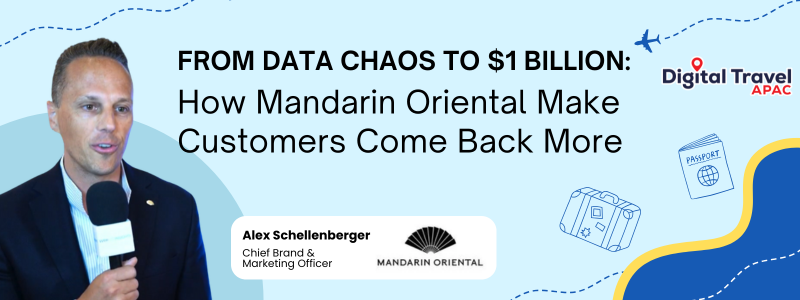From Data Chaos To $1 Billion: How Mandarin Oriental Make Customers Come Back More

Luxury hospitality just solved the problem killing most retail loyalty programs: fragmented customer data across every touchpoint.
Alex Schellenberger, Chief Brand & Marketing Officer at Mandarin Oriental, explains how breaking down silos didn't just improve guest experience, reshaping how the brand drives retention, local revenue, and lifetime value.
Watch the full interview with Alex Schellenberger below.
At a time when most loyalty programs chase transactions, Mandarin Oriental is building emotional equity, proving that intelligence and intimacy can coexist at scale.
Inside Mandarin Oriental’s Loyalty Reinvention
The Five-Profile Problem
Before data consolidation, a single guest could have five different profiles across one property. F&B preferences didn’t connect to spa records; allergies noted in the restaurant system were invisible to room service; wellness data lived separately from dining habits.
“None of the data points were speaking to each other,” Schellenberger says. “We couldn’t drive preferences based on what you eat, your allergies, or your favourite spa therapist.”
By unifying all data across rooms, spa, F&B, and wellness, Mandarin Oriental can now deliver truly connected personalization and build one dynamic profile per guest.
💡 Retail takeaway: Your customer doesn’t shop in silos. If your systems don’t talk, you’re treating loyal customers like strangers.
Staying Relevant Between Purchases
Most guests visit two to three times per year across 45 properties. The challenge: staying relevant between stays. Instead of more emails, Mandarin Oriental relaunched its app and expanded its Fans of MO program so that restaurant, bar, and spa spend now count toward loyalty tiers.
It’s a subtle shift with massive impact especially since 80% of restaurant guests are local, not hotel residents.
💡 Retail takeaway: Don’t let loyalty hibernate between big purchases. Reward micro-transactions — the coffee stop, the pickup, the app browse — to stay top of mind.
Gamification That Carries Meaning
Mandarin Oriental’s iconic fan, a symbol of quiet luxury since 1886, now powers an app feature where guests collect unique digital fans from each property. Each design connects to local art or heritage, transforming a stay into a collector’s journey.
💡 Retail takeaway: Gamification only works when rewards feel symbolic, not superficial. Connect status to your story.
Service Before It’s Asked
“The best service is always the one that’s delivered before it’s even asked.” Predictive AI now crafts itineraries that adapt to weather changes and uses wellness data to suggest rest days, spa treatments, or meal options, all while keeping the brand’s legendary human touch.
💡 Retail takeaway: The next edge in AI isn’t reaction — it’s anticipation.
Money-Can’t-Buy Beats Discounts
Partnerships like The Luminaire give guests exclusive access to after-hours Prado Museum tours and curated experiences no competitor can replicate.
💡 Retail takeaway: Replace discount-driven loyalty with access-driven loyalty. Exclusivity builds brand equity, not erosion.
Brand as the Ultimate Strategy
“For us, everything starts with a brand,” Schellenberger says. “A stronger brand drives desirability — and desirability drives value.” At Mandarin Oriental, every technology decision is filtered through brand DNA: does it strengthen emotional connection, or dilute it?
Watch the full interview with Alex Schellenberger to see how Mandarin Oriental balances predictive AI and timeless service to turn guests into lifelong fans.